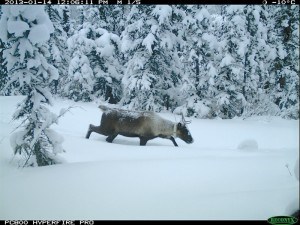
Parks CanadaÔÇÖs decision on backcountry closures, released last week, strikes a fine balance between caribou conservation and winter recreation.
The agency announced July 26 that the Brazeau and A La Peche caribou ranges are the only two areas of Jasper National Park to have delayed winter recreational access. The delays will come into effect this winter and both areas will open March 1.
The Brazeau range encompasses the area between Bubbling Springs and Beauty Creek Hostel on Highway 93 West. The A La Peche range is the north boundary area of the park.
The winter closures are an attempt to protect woodland caribou from wolves, who have been shown to use compact ski trails to access caribou where they would otherwise be safe from predation.
The proposal to close areas for caribou conservation, even before it was approved, was applauded by the Canadian Parks and Wilderness Society (CPAWS) in its 2013 State of CanadaÔÇÖs Parks report released last month.
ÔÇťWoodland caribou are at critically low numbers in Jasper National Park, so delaying the opening of certain trails is an effort to help recover caribou within the park, and we are supportive of that,ÔÇŁ said Anne-Marie Syslak, executive director of the southern Alberta chapter of CPAWS.
Woodland caribou are listed as a threatened species under the Species at Risk Act. There are 50 in the Tonquin herd, 15 in the Brazeau and six in the Maligne and about 125 in the A La Peche.
ÔÇť[Our decision] captures the conservation gains that we needed and at the same time maintains our leadership role as a premier winter destination,ÔÇŁ said Greg Fenton, superintendent of JNP.
Parks received push back from backcountry users and businesses last winter, when it first proposed the closures. As a result of that feedback and months of public consultation, Parks has removed the Poboktan/Maligne Pass area from the list of closures. It could be included in the future, but that will depend on the results of the Maligne Valley Implementation Strategy that Parks is currently compiling.
Also a result of public feedback, Parks wonÔÇÖt be extending the Tonquin Valley closure, as was proposed. Rather, the Tonquin will open Feb. 15, as it has done for the last five years.
The original area closure will be expanded, though, to include the Astoria River, Portal Creek and Meadow Creek drainages. ThatÔÇÖs in addition to the Cavell Road and Astoria Trail area that has been closed previously.
Another result of the consultation process is the addition of new recreational opportunities in two areas: Decoigne and Pyramid Lake. This winter, Parks expects to already have new track set and compacted trails at Decoigne. That will be Phase 1 of a multi-phase project to increase the winter opportunities in areas of the park that arenÔÇÖt critical caribou habitat.
ÔÇťWe have been criticized lots in the past, that we had predetermined decisions and have engagement processes, but donÔÇÖt really listen, but I think this an example of an engagement process where we were indeed actively listening and we were respondent and we made changes,ÔÇŁ said Fenton, noting that the decision will result in gains for both caribou and recreationalists.
ÔÇťI think our park can be really proud of these decisions,ÔÇŁ said Loni Klettl, an avid backcountry user, who was consulted during the decision-making process. ÔÇťWe did a good job and everybody worked so hardÔÇönot only the public, but Parks, too.
ÔÇťFor all the stress that we went through, everybody pulled up their socks ... and now we can move forward with caribou conservation and winter in Jasper.ÔÇŁ
Klettl, whoÔÇÖs a founding member of the Jasper Trail Alliance, said the proposed closures Parks presented last winter were just ÔÇťblobsÔÇŁ on a map that didnÔÇÖt take into consideration the terrain. But after consultations with backcountry users, the agency adjusted the boundaries to allow for recreation in areas that arenÔÇÖt utilized by caribou. That includes ice climbing areas like Sunwapta Canyon, Beauty Creek and Tangle Ridge.
Those discussions also resulted in an inventory of prime backcountry terrain that Parks and the Trail Alliance will promote as winter comes closer.
ÔÇťUntil this decision, we couldnÔÇÖt really promote what we have,ÔÇŁ said Klettl. ÔÇťNow we can promote it and increase use and get people out there, while giving caribou the space they need.ÔÇŁ
Nicole Veerman
[email protected]
